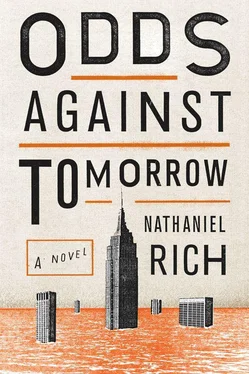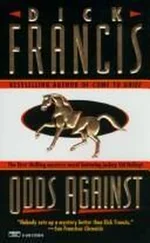Most New Yorkers carried on with their usual activities, pantomiming quotidian normalcy, as if nothing were wrong. But a quiet lethargy had jammed the city’s clockwork. Pedestrians zombified at the curbs, cyclists walked their bikes through the traffic, cabs inched, trains stalled. Subway platform fainting spells became so common that EMS workers set up triage posts at the Grand Central, Borough Hall, and Times Square hubs. And the sky — everybody was talking about the sky. It was brassy, smoldering. But even though the days were sunny and bright, the haze, which rose from the pavement in velvety curtains, reduced visibility to less than a square block. Garbage burst into flame spontaneously, but the fire department had been ordered to let these small fires burn themselves out. There was no water to spare. They had to save the water for the expensive fires, the ones that threatened full city blocks and office towers and glassy high-rises. In neighborhoods in upper Manhattan and the outer boroughs, the city had cut off the fire hydrants, complaining that too many kids were popping off the fireplugs, turning them into fountains. There was not enough water left in the reservoir for such frivolity, said the fire commissioner. Civil rights groups had filed suit.
Mitchell pushed through the revolving door in the lobby of the Empire State Building and broke into a sprint. The heat stopped him flat after half a block and he burst into a coughing fit, hacking out thick gobs marbled with black dust. He wondered what was in the dust. That morning the Air Quality Index had crested to 240, which put it safely in the Very Unhealthy zone (defined by the EPA as “everyone may experience more serious health effects due to airborne toxic particulate matter”). The whole Northeast was blanched, wilting. If only a big storm came along, said the meteorologists. Better yet, a series of big storms. If only.
By Third Avenue Mitchell was dripping on the sidewalk, big globular drops. The ovals of sweat that had spread concentrically outward from his armpits and neck had reconnoitered on the front of his shirt. Or was his stomach sweating too? Yessir. The stomach and the groin and the back had all jumped into the pool. The only part of his body that was not slick with moisture was the inside of his mouth. He had entered a new hell, and he was burning up. But it felt good, these flames, felt right. After the tepid limbo of the last three weeks, he welcomed the demotion to a lower circle. He welcomed the flames.
As promised the long wooden crate lay across the lobby, at a gratuitous angle — it could have been nudged in such a way that it didn’t block the entrance, but the doorman was proving a point. Mitchell held up one finger as he slipped past the doorman, who was muttering vile things in a Slavic language, and raced up the stairs. He removed ten twenties from the freezer — his face gasping in the cold air — and returned to the lobby. The first three twenties made the doorman stop cursing. The next five made him help Mitchell carry the Psycho Canoe up the stairwell. Two more twenties — and the reassurance that the box did not contain a coffin or a body — convinced him to help Mitchell break apart the crate. The doorman brought up a hammer and a bar. It took ten minutes. The planks of wood lay in a pile in the center of Mitchell’s living room like a pyre.
“Do you want me to take the wood away?” asked the doorman, eyeing the freezer.
Mitchell declined. He wanted to be alone with his canoe.
It occupied most of the living room. In order to clear enough space, Mitchell had to fold the plastic dining table, move it into the closet, and shove the couch into the corner. As the sky darkened, turning from pearl to mouse to soot, he ate dinner in the canoe, pensively dipping cold leftover spring rolls into cold, gelatinous duck sauce. He removed his shoes and pants. He fell asleep there with the television on, his head under the bow seat. It was a cosy berth, there in the hull of the Psycho Canoe. For the first time in two weeks — since he’d heard about Elsa — he slept like a corpse.
2.
Charnoble stepped into Mitchell’s office, scissors in one hand and a long red ribbon, trailing to the ground, in the other. When Mitchell turned to face him, Charnoble sliced the ribbon in half.
“We’re moving on up!”
The ribbon slithered to the rug. Mitchell waited patiently.
“I’ve been thinking about it, and I agree with you. We need a new office. Being in the Empire State Building undermines our authority.”
“Our safety, really. It undermines our physical safety. That’s the issue.”
“Don’t worry, I’ve found a place. We’re going to get out of this death trap.”
“That’s good news,” said Mitchell. He looked around his office, taking stock as if for the last time: the bare walls, the four clocks (one per wall), the low ceilings, and the expansive ivory carpet, its dense piles no doubt flourishing with bacteria (staph and E. coli assuredly, with even odds on salmonella). In the middle of the carpet lay a cardboard box, delivered that morning, that contained a pair of Day-Glo-orange PFDs, personal flotation devices. He figured they could serve as cushions for his canoe-couch.
“I’ve decided to let you go free,” Charnoble added, smiling with every tooth in his head.
“Free?” Mitchell’s intestines clenched. Would he have to beg Sandy Sherman for his old job? Maybe he could sell the canoe back to the gallery — that would buy him a couple of months.
“You don’t need me on your consultations anymore. You’ll be flying solo.”
Mitchell exhaled. “Are you saying that you won’t accompany me to the terror meetings?”
“I trust you, Mitchell.”
“It won’t be a problem.”
Nor would it make much of a difference — Charnoble, after all, had been increasingly absent in the meetings. But Mitchell asked for a raise nonetheless. Charnoble granted it before the words left Mitchell’s mouth. He seemed surprised that Mitchell hadn’t asked for more.
It was difficult to tell exactly when it started, but there was no denying it now: FutureWorld had entered a boom period. Even before the raise, Mitchell’s commission-based salary had inflated spectacularly. And from the moment the Psycho Canoe had arrived at his apartment, the old Mitchell gradually began to return. His obsession with issues of cause and effect, interconnectedness, fate, and doom had never been stronger, so his mind was particularly well prepared for apocalyptic visions. Elsa’s blind optimism had deluded him, but her influence was beginning to wane. As the shock of her attack receded, he began again to see the world for the thermodynamic time bomb that it was. He resumed his old habits, stalking the library and monitoring daily disaster news from around the globe. It soon became clear to him that, during his brief vacation, conditions had only gotten worse. He could feel it intuitively: disaster was real, and it was coming fast, like an asteroid plummeting from the sky. Perhaps it was an asteroid plummeting from the sky. Something giant and obliterating was rapidly encroaching. What did it matter whether it were a bomb or an earthquake or a drought?
His Cassandra tales grew more persuasive, more specific. Perhaps too specific. During consultations he wrote calculations on a whiteboard, teaching them to his clients like a satanic high school algebra teacher. His favorite was the one developed by a Stanford statistician that predicted the odds of a nuclear war in the next year:
λ CMTC= λ IE P 1 P 2 P 3
λIE was the annualized probability of an event that could lead to a nuclear showdown (or Cuban-missile-type crisis). P 1 was the probability that such an event actually results in a showdown. P 2 was the probability that the crisis leads to the launch of a nuclear weapon. And P 3 was the probability that the initial nuclear bomb results in a global nuclear war. Multiply the factors together, and the answer came out as one in ten. Every single year, in other words, there was a ten percent chance that the species would extinguish itself.
Читать дальше












